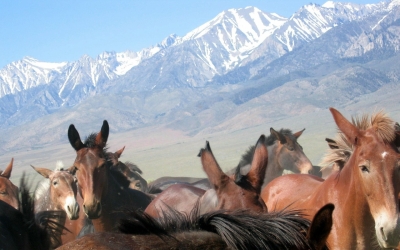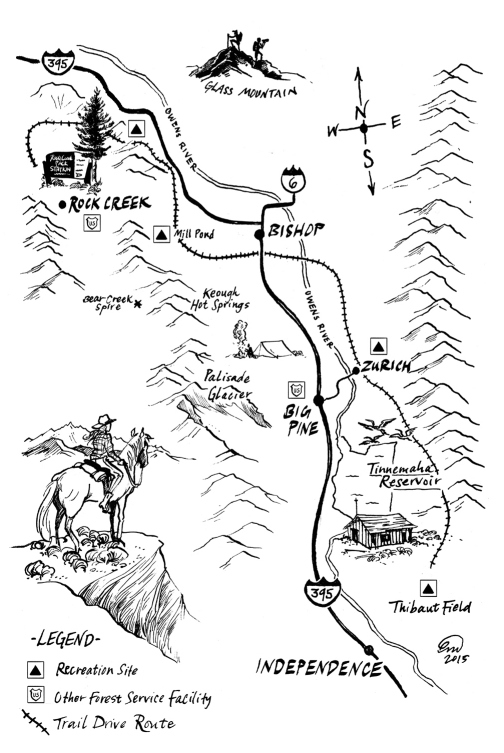Trip Overview:
Join us in herding horses and mules between our winter range in the Owens Valley
and our Pack Station in the High Sierra. Since 1968, the first time we took guests,
the Horse Drives have been the most exciting four days of the year. You do not have to
be an expert rider but should have some time in the saddle. We have mounts to suit your ability.
The cook and camp crew have a comfortable camp set up in advance of each arrival. Tents and all
the good food you can eat are provided. Just bring your sleeping bag and personal gear.
Read guest comments about the Horse Drive adventure.
What you need to know for Horse Drives
Dunnage limit is 40 lbs. per person (this includes sleeping bags,liquor, etc.). Yes, it is 10 lbs more than our pack trips!
You may bring your own tent up to 10 pounds that is in addition.
PERSONAL CHECK LIST
Bring belongings in stout canvas or nylon duffels; side zipper recommended, ideal size approximately 14" x 32". It is a good idea to use a large plastic bag INSIDE of the duffle to protect contents from external moisture.
Sleeping bags can be in separate duffels --again, line the inside of the duffle against rain.
Place all cosmetics, soaps, medications, etc into small plastic containers with close-fitting caps, THEN into sturdy resealable plastic storage bags. If anything breaks or bursts from altitude changes, the plastic bag contains the spill.
When possible, it is a good idea to transfer alcoholic beverages to sturdy plastic bottles with well fitting caps - it will save weight and protect against breakage.
RECOMMENDED ITEMS:
- Sleeping bag with a comfort range of 20 to 60 degrees and a moisture proof ground cloth.
- Air mattress or small 1/4"-1/2" foam hip pad recommended - your night's rest will affect your next days enjoyment.
Bring the best sleeping pad you can manage.
- Broad-brimmed hat is essential for protection from sun at high altitude. It must have strings to keep from blowing off.
- Sunglasses (RX glasses) - high altitude sun is BRIGHT!
- Coffee mug (plastic for camp)
- Pint water bottle for your horn bag
- Pocket knife or small multi-tool
- Flashlight and extra batteries
- Camera and film (sturdy strap)-- if using digital - don't forget an extra battery and card
- Rain jackets and pants or slicker (rolled up you can tie them to the back of your saddle)
- Hat protector (to keep your hat dry)
- Light jacket (windbreaker)
- Wool or fleece pullover/sweater (layers will keep you comfortable)
- Heavy jacket
- Bandana
- Woolen cap (evenings can be cold)
- Gloves (recommend gloves for riding, may want warm gloves for evenings)
- Socks
- Riding boots
- Shoes for camp (moccasins, athletic shoes, etc)
- Shirts and pants (long sleeved shirts offer sun, bug and branch protection)
- Underwear
- Bathing suit
- Bath towel/wash cloth/soap (try a multi-use bar or liquid for use on hair, body and laundry. Biodegradable choices are available.)
- Insect repellent such as Cutters
- Toothbrush/toothpaste
- comb/brush clips/pins/ponytail holders
- Shaving kit (a small mirror is helpful)
- Sun Screen (lotion, cream or stick)- use liberally for sunburn and chapping prevention.
- Chapstick with sun protection SPF 15 or better
- Moisturizer (cream or lotion - altitude and sun can be dry and chap skin)
- Prescription medicine (if required - if you have any allergies, remember to bring appropriate medication)
- Band-aids, aspirin, ibuprofen, eye drops, moleskin for any blisters
- Baby powder/Talcum powder (helps to relieve any raw or irritated areas from boots, clothes or saddles)
- Kleenex
- Jogging suit (sweats are comfortable for after-swim and campfire lounging)
LOW-IMPACT GUIDE FOR THE WILDERNESS USER
We are dedicated to conducting our trips so that others following us will find the country unspoiled. Livestock is a natural part of the wilderness and when properly managed enhances man's enjoyment of our unmechanized wilderness area. Today, just as it was when the entire west was mostly wilderness, the horse and mule remain our companions and servants in wilderness travel. We practice and expect you to observe the following during your trip.
- Keep horses on trail; do not cut switchbacks (corners).
- Tie horses 200 feet away from streams, trails and campsites. At camps, horses and mules are tied to picket lines,
stretched between trees on granitic soil.
- If you can't tie animal to picket line use a tree greater than 8" in diameter, not on grass. Tie high and short (2-3 ft.) so horse doesn't get foot caught in rope.
- Choose a tent site at least 100 ft. from water (THE LAW) where drainage will not be a problem, avoiding the need to trench. No tents or camp area allowed on grass or meadowlands.
- Utilize pre-existing fire rings where possible. Don't surround fires with rocks! Dig a hole in sand and cover when finished. When you leave camp, bury ashes from fire rings. Leave existing fire rings clean for the next user.
- When breaking camp, return the spot to its natural state and broadcast a covering of needles and cones. Scout the area to make sure nothing will be left behind. Remove the smallest pieces of aluminum foil and trash.
- Pack out all trash. Don't bury garbage, scatter organic wastes or leave foil in campfire pit. Burn cans and flatten. On our group trips we have a bag for cans and aluminum foil.
- Don't use soap (even biodegradable) in streams or lakes, Wash yourself, clothes and dishes away from water sources.
- Bury human waste 200 ft. from water, campsites and trails. Dig a hole 4-6" deep and after use tamp with sod.
- Don't pick flowers or cut branches from live trees. Use only downed wood for fires.
- You are required to keep bears from getting to your food at all times. Please ask for current regulations and suggestions on how to prepare for your trip.
Call us TODAY at 760-872-8331 for a quick response to your questions.
You can email us, also.

Please note that per California Senate Bill 478 (SB 478),
also known as the Hidden Fees Statute,
the prices shown for our hiking trips and trail rides include the fees.
Your reservation will reflect a breakdown of all fees, and the base price of the trip.
FEES:
All Trail Rides and Packing Schools are subject to a 2% USFS fee.
Horse Drives are are subject to a 3% USFS fee.
Mustang Trips are are subject to a 3% USFS fee.
Trips traveling in Yosemite National Park are subject to an additional 3% park use fee.
Trips traveling in the Sequoia and Kings Canyon National Parks are subject to an additional 3% park use fee.
Permits and permit monitoring fees are applied per person for trips. Permits are issued from the commercial allocation.
Rock Creek Pack Station, Inc operates under permit on the Inyo National Forest.
NOTICE: In accordance with Federal law and U.S. Department of Agriculture (USDA) civil rights regulations and policies, this institution is prohibited from discriminating on the basis of race, color, national origin, sex, age, disability, and reprisal or retaliation for prior civil rights activity. (Not all prohibited bases apply to all programs.)
Persons with disabilities who require alternative means of communication for program information (e.g., Braille, large print, audiotape, American Sign Language, etc.) should contact the responsible State or local Agency that administers the program or USDA?s TARGET Center at (202) 720-2600 (voice and TTY) or contact USDA through the Federal Relay Service at (800) 877-8339. Additionally, program information is also available in languages other than English.
To file a complaint alleging discrimination, complete the USDA Program Discrimination Complaint Form, AD-3027 , found online at http://www.ascr.usda.gov/complaint_filing_cust.html , or at any USDA office or write a letter addressed to USDA and provided in the letter all of the information requested in the form. To request a copy of the complaint form, call (866) 632-9992. Submit your completed form or letter to USDA by: (a) mail: U.S. Department of Agriculture Office of the Assistant Secretary for Civil Rights, 1400 Independence Avenue, SW, Washington, D.C. 20250-9410; (b) fax: (202) 690-7442; or (c) email:program.intake@usda.gov.
USDA is an equal opportunity provider, employer, and lender.
Last Updated: July 11, 2025
Copyright © 2005-2025 Rock Creek Pack Station - All Rights Reserved
|














